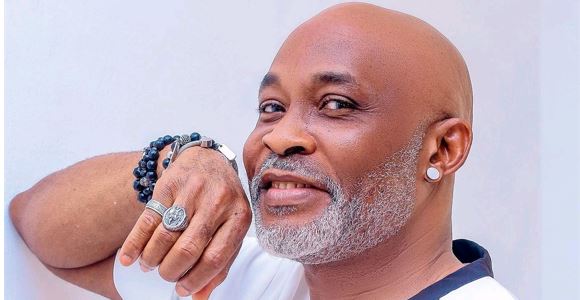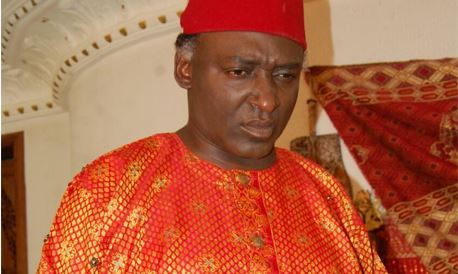Richard Mofe-Damijo’s life reads like a fairy tale. Yet the Warri-born, UNIBEN-trained and Nollywood-famed actor defies description. Many see him from different angles: as an actor, lawyer, teacher, journalist and public relations expert.
But what they are comfortable with, both the high and the low and which has stuck is the name, RMD.
RMD? Yes, RMD, the Wafi boy who as the cliché goes came to Lagos, saw and conquered. Still who is RMD? Who is this guy with the Sean Connery stature and charming looks many men wish they were and lots of women not only jostle to fall in love with but also crush and dote on? Who is this guy that has been able to maintain his swag and remain relevant?
Who is this guy that came out of the oil-rich but deprived city, Warri, and conquered Nollywood? Who is this guy with swag who once described himself as a simple Warri boy? “I am just a simple Warri boy that came to Lagos and found some fame and I am grateful for it,” he once said.
How did this simple Warri boy become RMD and conquer Nollywood? Or did Nollywood find him? He knows too well how it all started. “I didn’t see all of it. All I said to my mom, standing before her as she was crying was, ‘Mama, don’t worry. You go see me for television.’ I knew I wanted to be in that box. That’s all I wanted,” he was once quoted as saying.
Truth is, there is more to RMD than meets the eye. RMD has become a song and a dance; a name that is not above every other name but beyond him. It has become not just a household name, but the one virtually everyone’s lip. Though coined by veteran journalist, Femi Akintunde Johnson, the fact remains that RMD has become more than a name.
RMD is a lifestyle, a metaphor for the actor who many regard as the lover boy of Nollywood. RMD is a name that was, even before it burst into public space. It’s a name rich with history, a name that connotes swag, bravado, style and success.
Little wonder he was the topic of discourse at one of the sessions in the just concluded week-long cultural fiesta, Lagos Book and Art Festival, LABAF, which held at Freedom Park in Lagos on Wednesday 17 November.
And on hand to do justice to the theme, In Cold Text: How I made it in Nollywood, was Toni Kan, writer, poet and novelist, who reviewed RMD’S book. Portrait of A Warri Boy, which in many ways is a recipe for success. The title of Kan’s review is: Wafi boy comes to Lagos: Annotations on RMD’s “Portrait of a Warri boy”.
Indeed, how did the Wafi boy make it in Nollywood? The agelessly charming personality and man of style got writers such as Dele Momodu, Femi Akintunde-Johnson, Zik Zulu Okafor, Joke Silva, Ego Boyo, Tade Ogidan, Toyin Akinosho, Segun Ojewuyi, etc. to write what they know about him in the book.
“RMD’s life reads like a fairy tale but to insist on that is to discount what many have described as his talent, his perseverance, his grit, his dedication and above all his generosity of spirit,” Kan averred.
A fairy tale? Certainly. The question now is that how did this fairy tale become a real, palpable success story? How did it become a study in grit and determination to succeed?
“How did RMD, as Azuh Arinze writes, achieve his longevity and relevance? How did he manage to, despite forks in the road and a dalliance with politics retain his top spot in an industry redolent with talent and hunger and ambition?” Kan asked.
Arinze hinged his longevity and continual relevance in the entertainment industry to his knack for reinventing himself. “RMD had long stood out and he is still as relevant as ever. He is constantly reinventing himself and his career. I remember him telling me during one of our interviews: ‘Azuh, I refused to be downstairs’. The unarguable and unassailable fact remains that the story of Nollywood, television and stage performances in Nigeria cannot be complete without a deserved mention of that name that extracts and elicits joy and happiness wherever and whenever it is mentioned…” Arinze writes in the book.
“Success, respect, and adulation did not come overnight. The formula for making any dream come true is a mixture of determination, considerable ingenuity, knowledge, competence, and love. ..RMD is the complete antithesis to what you might imagine. He is a great teacher, remarkably honest, deeply spiritual, voracious reader, foodie, whisky connoisseur, and always generous…” so said Sam Umukoro, one of the contributors to the book, wrote about how his first encounter with RMD led to a relationship that later blossomed.
“That day was the beginning of many encounters with RMD that brought me close to the truth about him. A relationship blossomed – from a journalist, I became a friend, and then younger brother and mentee.”
Kan indeed did justice to the book by letting the audience have rare insights into what some of the contributors said about RMD. “As John Nwaobi writes, when RMD came to squat with him in room M17 at UNIBEN, the squatter brought along another squatter. Nwaobi writes that his action did not stem from audacity or indifference but from benevolence.
“Commenting on his ability to navigate and transition through epochs, Ego Boyo writes that RMD’s success secret is that “he has remained teachable and open to new ideas.
“The book is full of anecdotes. Stories of youthful exuberance and daring, of times spent drinking and chasing girls and also of a young man with a commendable work ethic who is described as “seldom ever late” and who despite his “fine boy, no pimple” image as Gloria Rhodes writes, was among the first actor of his generation to build himself a house in the upscale Omole estate in Lagos.
“Oluwatoyin Kole-Odutola borrowing a template from Ali Mazrui’s The Trial of Christopher Okigbo describes RMD’s journey as that of a man playing a “noble role as an artiste in a post-colonial society,” Kan recounted.
Still, a very remarkable thing about RMD is that there were many forks in the road. As Kan said in his review, RMD would not have been actor had the wish of his Uncle (Uncle London) who wanted him to study history or law prevailed.
“If there hadn’t been a fork in the road, RMD would have ended up with a degree in History instead of Theatre Arts and if he hadn’t been so spoilt enough to argue with an elder, Uncle London would have triumphed and convinced RMD’s mum not to let him study theatre arts which was for people “wey no serious.” His preference, as RMD argued him under the table, was for history or law,” Kan said.
RMD’s life “is punctuated by so many forks in the road,” Kan said vouchsafing the audience glimpses into the book. “If there hadn’t been a fork in the road with Kings College not employing him full time because there was an employment embargo, RMD might have made a career as a teacher who dabbled in acting instead of the uber-talented and garlanded actor we know him to be.
“A super star who has managed to transition from the analogue to the digital age, RMD is a digital migrant with 2.5m followers on Instagram, the face of Schweppes in which he says that “change is inevitable”, a Glo Ambassador, fashionista and uber celebrity.
“Today, he is the husband of Jumobi, father to Nicole and Mena as well as Brume and Tega and also a grandfather. A public figure with one of the most recognizable faces in Nigeria, RMD is described as an intensely private family man as well as a genial and generous friend with a forgiving and loyal spirit.
“The roll call of contributors is testament to the man they say he is; one who is age and class agnostic. We glean these from the recollections from former roommates to fellow actors, friends from NUTAF and NYSC, former staff and journalist colleagues as well as younger journalists and comedians whose paths crossed with RMD’s as mentor to mentee,” Kan maintained.
@Kazeem Ugbodaga




















